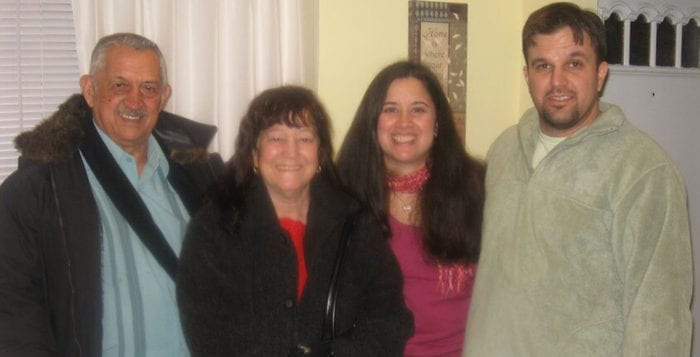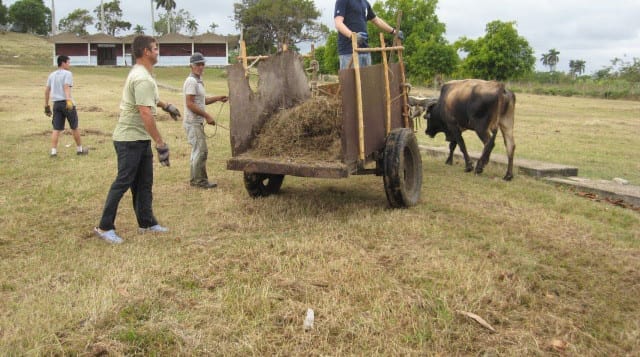By Amelia Estevez Creedon
I am a Cuban-American woman born and raised in New York City. My parents have instilled in us a love for the United States and patriotic passion. We are also proud of our Cuban heritage and are affected by situations that arise in my parent’s native home.
My father came to the United States in 1960 after fleeing the Communist regime. My mother came to the United States in 1961. They met in the United States and married in 1971.
My father lived a prosperous life in Cuba.
He was a farmland owner and a veteran of the Cuban military. He also did many side jobs. One of his side jobs under the Batista government was to drive dignitaries to their desired destinations. My father loved Cuba. He loved the nightlife and time with friends and family and was very proud to be Cuban.
My father was imprisoned. He remembers hearing men cry before they died in front of the firing squad. He was beaten, starved and tortured.
But when Fidel Castro took power in Cuba, everything changed. My father was imprisoned. He remembers hearing men cry before they died in front of the firing squad. He was beaten, starved and tortured. The soldiers would insult, humiliate and mutilate the prisoners. The men in the prison were not criminals, but people that were incarcerated for voicing their opinion, going to church, refusing to join government-run organizations and more. My father was able to escape from prison and Cuba and help other families come to the United States.
My mother lived with her parents and two sisters. They were poor and worked hard to make a living. My grandfather was a mailman. My grandmother washed clothes for neighborhood families. Despite their poverty, my mother has precious memories of her country. She remembers school being a place of great learning. She recalls the love that existed between neighbors. She remembers a childhood filled with dreams, play and joy. All that changed after Fidel Castro took power.
Castro established watch groups within communities to make sure that civilians were obeying the rules he had in place. Neighbors began turning in neighbors for playing television programs that were considered anti-revolutionary, or eating food that was meant for the soldiers, or for gathering for prayer, or expressing views that were different from that of the government.
My mother remembers the frequent assaults on her house. Soldiers would enter by force in the middle of the night. The rationale for this entry might have been that a neighbor had heard them speaking ill of the government, or that they had some item that was considered counterrevolutionary. One night, my mother’s family was told to remove their crucifix from the house and replace it with Fidel Castro’s picture. My grandfather refused and was taken prisoner. He was incarcerated in a dark enclosed space, alone, starved, beaten and humiliated.
My grandparents knew they had to leave the country.
My mother remembers the frequent assaults on her house. Soldiers would enter by force in the middle of the night.
They applied for a program through which they might gain permission to leave. This program consisted of the family working in an agricultural camp for two years. This did not ensure exit from the country but placed their name in a lottery. The family was separated within the camp and lived in barracks. Life in the camp consisted of working from dawn until dusk cutting sugar cane. The work was brutal. The workers were given raw horse meat to eat, had no work breaks and limited water. My mother remembers being taunted by the soldiers. They would spit at her, call her “gusano,” which means worm, and was a popular derogatory term used to describe anti-Communists. The barracks had bunk beds with no mattresses or pillows. The workers were housed in these cramped quarters and the outhouses were filthy and unkempt.
My dad passed away this past March. My grandparents died two years ago. They knew that the government was still oppressing many, as well as incarcerating political prisoners and dissidents on the island.
This type of oppression continues today. The inhumane treatment of many Cuban citizens is still occurring. My parents, as well as grandparents, became United States citizens shortly after arriving. When they first arrived they worked long hours cleaning floors, waiting on tables, basically doing whatever work was available. My father was able to learn different trades as time passed so that he could better provide for our needs. Neither of them was a stranger to hard work and they taught my brother and me to value it as well.
They came to love the United States as their home. They were, and my mother still is, fiercely proud to be United States citizens. They taught us to love our country but to always have hope that Cubans in Cuba might also one day be free. They always reminded us that anyone could be successful if they worked hard in the United States and that freedom was not free. Every year our family prayed that Cuba would be liberated from this dictatorship. For my father and grandparents, Castro’s death would have restored a glimmer of hope that despite the years of tyranny, things could change.
Unfortunately, my grandparents and father never saw this day. Fidel Castro’s death does not mean that communism is over or that the brutalities will cease. His brother, Raul rules similarly. Yet, Castro’s death gives many Cubans a hope for the future, a hope that one day democracy and freedom might come to Cuba.
Amelia Estevez Creedon lives in Sound Beach. She is an elementary school teacher at Riley Avenue Elementary School and a school librarian, the leader for a Webelos and Bear den for Cub Scout Pack 204 in Miller Place and a member of the Sound Beach Civic Association.






